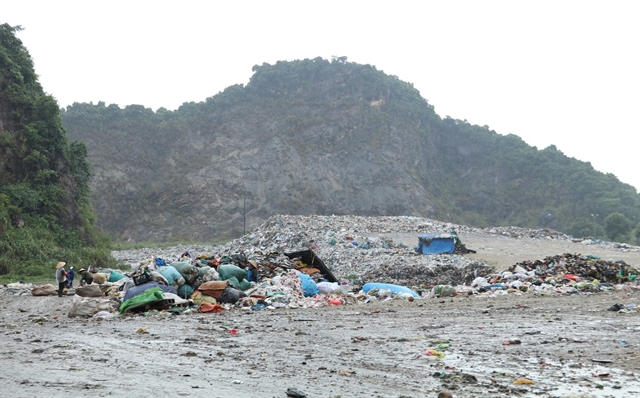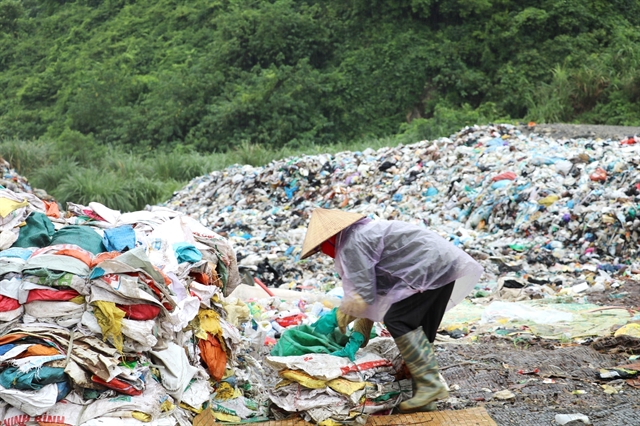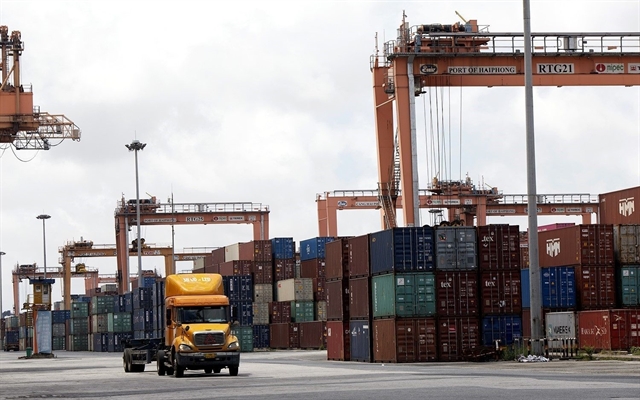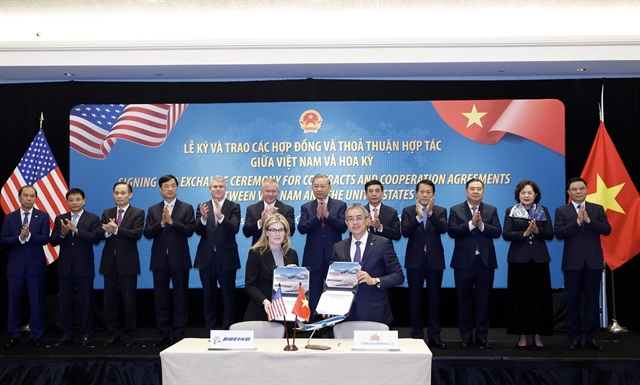.jpg) Environment
Environment

Đức Phương
 |
| The solid waste landfill of the Ninh Bình Solid Waste Treatment Plant. — VNA/VNS Photo |
NINH BÌNH — The Ninh Bình Solid Waste Treatment Plant is currently overloaded and will be filled by the end of this year, 20 years earlier than designed.
Put into operation since 2014, the Ninh Bình Solid Waste Treatment Plant in Đông Sơn Commune, Tam Điệp City of Ninh Bình Province has become the largest landfill and waste treatment centre of the province.
Along with processing waste into organic fertiliser, the landfill was designed to be used for 30 years.
However, after nearly 10 years of operation, the landfill area is almost full and is expected to be completely full by the end of this year.
This poses a difficult problem in the collection and treatment of solid and household waste, and ensuring environmental hygiene.
Currently, at the plant’s landfill area, the volume of garbage is very large. At some points in the landfill area, waste is piled up 3-5m high.
The surrounding area smells strongly, especially on humid days as the air becomes heavy and difficult to breathe because of the smell of garbage.
Along with that, processing garbage into organic fertiliser also has a stinky smell while more than a dozen workers diligently sort garbage into different groups in the damp and smelly air.
Lã Phú Dũng, the plant’s director, said that the plant is located on an area of 23 hectares divided into two main sub-divisions including the area inside the plant and the land area outside the fence.
Currently, the plant treats waste for eight districts and cities of the province.
In 2014, the amount of waste transported into the plant was about 150 tonnes per day in accordance with the designed capacity of the project.
 |
| People pick up trash at the landfill of the Ninh Bình Solid Waste Treatment Plant. — VNA/VNS Photo |
However, in recent years, the amount of garbage transported to the plant has gradually increased over time to about 380 tonnes a day, which is nearly three times the designed capacity.
This leads to many environmental consequences and greatly affects landfill and waste treatment, Dũng said.
The line is designed to process about 200 tonnes of waste per day under working conditions of three shifts a day.
However, due to the machinery working in a harsh environment causing damage to important parts, the plant currently only works one shift a day with a moderate processing capacity of 50 tonnes of garbage per day, he said.
If the machinery is pushed too much beyond its initial design, damages and more idle time needed for repairs would eventually happen.
The price of garbage treatment of VNĐ90,200 (US$3.7) per tonne is too low compared to the actual treatment cost. The factory has not been able to offset production costs by producing bio-fertilisers.
Currently, the Ninh Bình Solid Waste Treatment Plant is under management of Tam Điệp City’s People's Committee.
The representative of the city’s People's Committee said that the main reason for the waste being transported to the factory beyond the designed capacity is due to the rapid hike in the amount of household waste. In addition, most of the waste has not been classified at source.
Tống Đức Thuận, deputy chairman of the Tam Điệp People’s Committee, said that leaders of the committee and functional agencies have worked many times with the plant but so far this issue has not been resolved because many issues exceed the authority of the Tam Điệp People's Committee.
In mid-2023, the city People's Committee sent a document to the Ninh Bình Province People's Committee stating the current situation and proposing a solution.
Specifically, according to initial capacity, the plant processes about 125,000 tonnes of waste a year, of which 13,000 tonnes a year are processed to produce bio-fertilisers, and 113,000 tonnes are hygienically buried.
Currently, the factory is applying the unit price for waste treatment services at a provisional rate of VNĐ90,200 per tonne.
The factory expects revenue in 2023 of about VNĐ14.3 billion ($584,882) while spending is over VNĐ16.5 billion ($674,864).
According to the financial autonomy roadmap from 2022, the factory was not supported by the State budget. Therefore, the ability to balance self-income and expenditure cannot be guaranteed.
To ensure the operation of the factory, the Tam Điệp People's Committee proposed that the provincial People's Committee consider assigning a specialised unit in the province to preside and guide the provincial Solid Waste Management and Treatment Board.
The provincial People's Committee should assign specialised agencies to advise on the development and promulgation of prices for domestic solid waste treatment services consistent with requirements of ensuring the factory’s financial solvency.
The provincial People's Committee must consider providing financial support to the factory to compensate for losses of about VNĐ2.28 billion this year.
It is expected that by the end of 2023, the existing garbage landfill will be full, so the provincial People's Committee will consider planning new landfill areas and more plants to ensure waste treatment in the area in the coming years.
In order for the collection and treatment of solid and household waste to ensure environmental hygiene, the functional branches of Ninh Bình Province need to soon have a synchronous and timely solution to effectively overcome the situation faced by the Ninh Bình Solid Waste Treatment Plant. — VNS




